|
|
|
| Pubs & the Media | |
| He Went to the Harp with his Grandfather BILLY Fitzpatrick of Market Square, went to work with the City's milkman, Charlie Price, at the same age that he became a regular at the Harp Hotel. He earned 2/6 a week. "I walked from house to house, carrying four gallons of milk, two each hand," he recalled yesterday as he downed a glass of ale in a temporary bar at the back of the Harp Hotel. The Harp, the City's oldest pub, is being pulled down to make way for a new ??00,000 building. For Billy Fitzpatrick the old Harp has been like a second home. "I'll be 69 in May, you know," he remarked. "My grandfather ushered me through the swinging doors of the Harp at the age of five and I have been a 'regular' since. I didn't touch the beer until my 'teens, but I would sing a song for the 'locals' and collect a halfpenny to buy biscuits. "I have known all the important people in Wollongong in my time and drunk with many of them at the Harp. I knew 'King' Billy, the lot". The Fitzpatricks moved to Wollongong from Cooma in the late 1890s. At the age of 17 Billy decided to become baker and started with a leading firm. He is a veteran of two world wars. In 1914 he travelled with the 18th battalion as a pastry cook. "They sent me all over France to feed the boys," he said. "In the 1940-45 war, I marched with the 13th battalion. I was in the transport division." After the war, Billy opened his own bakery at West Wollongong, in late 1945, but retired several years back when Southern Bakeries moved in. |
|
|
|
|
| The Civic Father and Drinking on the Sabbath I heard rather a good yarn the other day, Mr Editor, about a leading local resident, and as the thing might spoil if bottled up, I tell it to you as it was told to me, and you may rest assured that it is bona-fide. The yarn, without being too personal, runs thusly :- A short time ago a gentleman who occupies a very important civic position not many miles from Wollongong was on a visit to Bulli on a Sunday, and being somewhat thirsty, he asked a Bulli gentleman in whose company he was knew where he could get a drink. The Bulli gentleman, who knew his way about pretty well, and who felt that he could do a 'long sleever' himself, led the Civic Father into a hotel (we will not say which one). Before entering the hotel, however, our Civic Father cast his eyes up the street and down the street, as if in search of some one, but, as the gentleman supposed, seeing no one whom he could invite in, he made a somewhat hurried rush for the door of the pub. After quenching their thirsts with a bottle of Lager, the Civic Father and his Bulli friend made as if they intended to leave by the side door. But the Civic Fathert first pulled aside a blind, peeped round the corners, slightly opened the door, pushed his head out, took a quiet survey up and down the street, as if dreading that the police might be about. This is what the Bulli gentleman thought was the matter with his friend, and knowing that the police are never about when wanted, he attempted to soothe his friend by assuring that there were no policeman about at that hour, as being up late on Saturday night, they generally slept it out on Sunday morning! The Civic Father upon this unburdened himself to the Bulli friend and informed in the most innocent manner possible that it was not the police he feared. He was a Wesleyan, and as the Wesleyan Church was only on the top of the hill he was afraid he might be seen by some of his co-religionists coming out of a pub on the 'blessed Sabbath'. Fortunately for his good name, the Civic Father managed to get clear of the pub without being seen by his brethren, to whom he is well-known as a gentleman of very high principle. -Illawarra Mercury Aug. 4 1887 |
 |
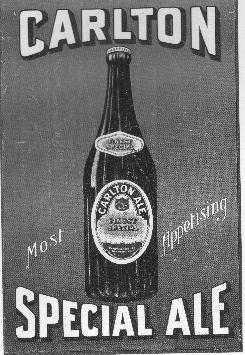 |
Olympian Visits Scarborough Pub LAST week 'Short Rounds' ran a story about the Scarborough Hotel's genrous offer of a free meal to all Olympic and Paralympic medallists. Steve, the manager of Cooneys Hotel in Wollongong, heard about the offer and showed up at the Scarborough dressed in a Cuban Olympic athlete's tracksuit with a 1975 Woonona netball gold medal around his neck. Complete with Cuban accent he told the publican he had come to collect his free meal! When the Scarborough publican asked the five-foot-nothing 'Cuban' what he had won the medal for, he replied: "Heavy-weight boxing, man." He was refused the meal, but given a free beer for his efforts! -Illawarra Mercury October 19 2000 |
| Melbourne Beer OUR contemporary thinks it not at all improbable that ale from Melbourne-on-Yarra may become as famous as beers from Burton-on-Trent and complacently reflects that 'if Australia can meet England on the vatted field, and beat her on her beer barrels, there is undoubtedly a great future awaiting this Austral continent'. -Australian Brewers' Journal, December 1891 |
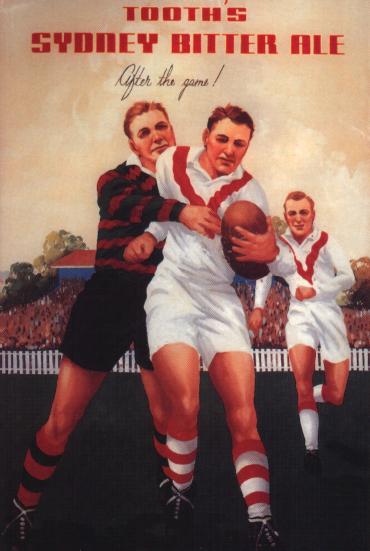 |
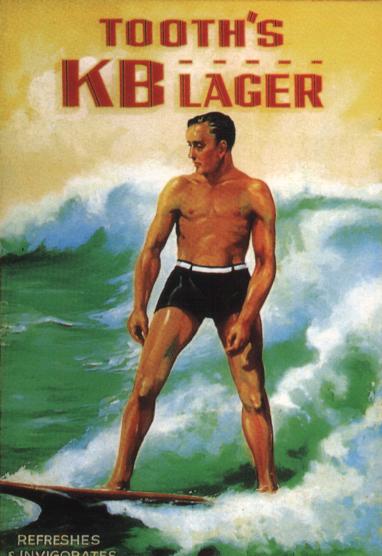 |
A Wowser's Letter to the Editor SIR, - For the past month or so the tranquillity of Smith Street and its neighbourhood has been disturbed by an intolerable nuisance, caused by a number of youths, whose ages range from 10 to 18 years, roaring out a number of songs, on their return from bathing, at about 7 o'clock in the evening, the most noticeable being "The old man's drunk again" and We'll never get drunk any more". This unearthly din commences on the top of the hill overlooking the bathing place, continuing across the paddocks to Smith Street, thence down Kembla Street, and when nearing Crown Street the company disperses. The "vocals" are materially assisted by one of the company playing the accompaniments on a piccolo. The uproar created by these larrikins cannot possibly be conceived by any person not living in their line of march. I would suggest that a member of our police force give attention to this neighborhood at once, and suppress this intolerable and unbearable nuisance. -Amor Pacis -Illawarra Mercury Feb. 28 1879. |
| Flu Ban Hits Pubs A PROCLAMATION ordering all hotels and registered club bars within a radius of 15 miles of the Elizabeth Street Post-office to close, in consequence of the influenza epidemic, was issued by the Minister for health, Mr Bower, on 12th February [1919] and as a result, no hotel, club or wine bar was permitted to open on the following morning. -Australian Brewers Journal, Feb. 1919. |
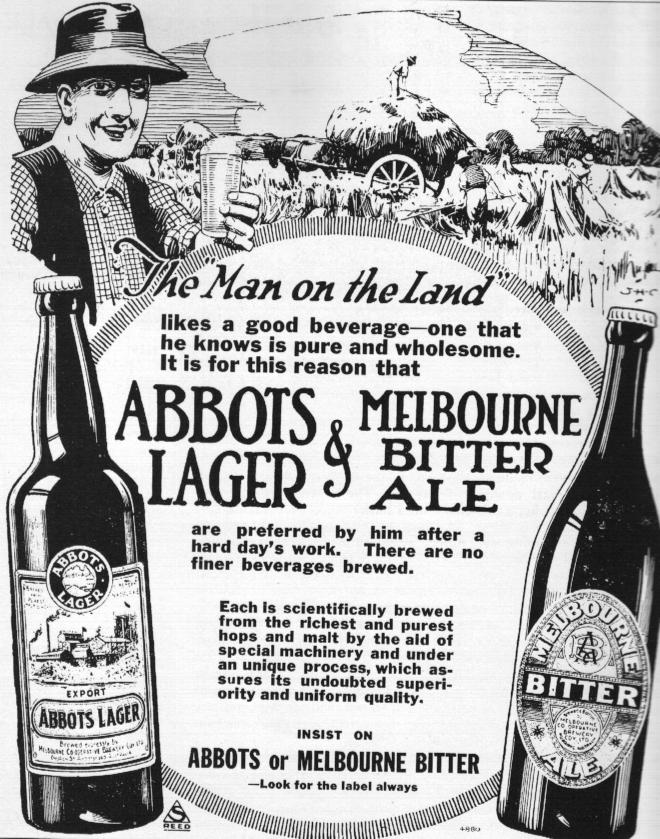 |
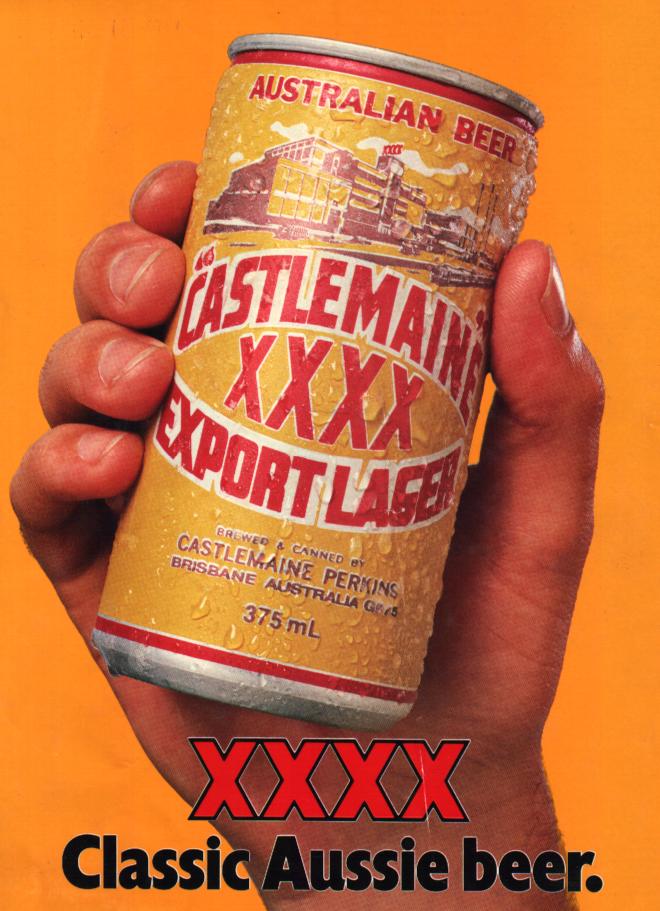 |
Calling the Pot Black FOLLOWING an announcement by the goldfields (WA) publicans to increase the price of beer to; imperial pots 9 pence, public meetings were held and all beer was declared 'black'. -Australian Brewers Journal, Feb. 1920 |
| Pulling the Wool Over a Publicans Eyes LED by an old pet ewe that aparently "new the ropes", a flock of 30 sheep raced into the bar of O'Gorman's Hotel, Albion Park on Wednesday, and temporality took possession. Some 10 minutes elapsed before the combined efforts of drovers, butchers and dogs succeeded in presuading the sheep to seek more sober surroundings. The same flock subsequently visited the Port Office, but the surrounding here not being so attractive to the sheep, eviction on this occasion was an easy matter. -Illawarra Mercury Friday April 7 1922 |
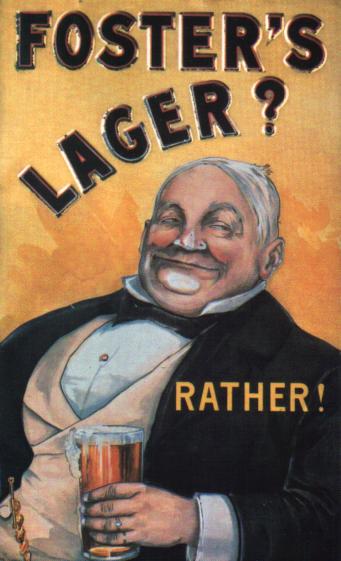 |
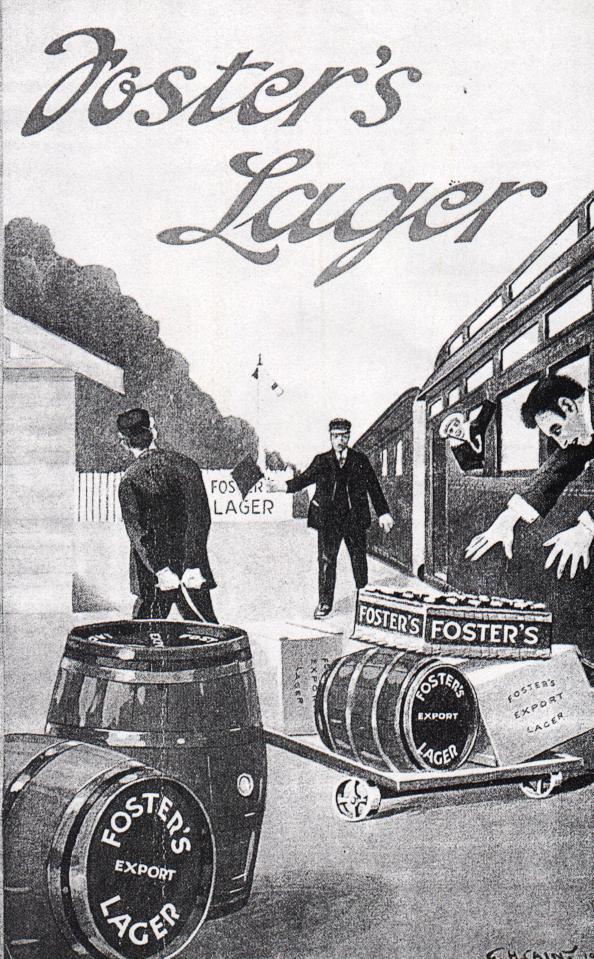 |
One Too Many A DEATH from over-indulgence in beer occurred towards the end of last month at the Commercial Hotel, Nhill, Victoria. A party of five navvies came into town on Saturday evening. On the road, they had one of two drinks. Upon their arrival, they bought a supply of goods for the week and then proceeded to the hotel to have drinks. One of the part was a man known as Scottie Allan whose real name is suppoed to be Aleck Roy. After having a drink, he stated that he had won a large wager by backing himself to drink nine pints of beer in seven-and-a-half minutes, and he offered to repeat the feat. The wager was taken up and then undertook to drink six pints in seven minutes, for fun. He accomplished the task in five-and-a-half minutes, stood up alongside the counter for about five minutes, after which he fell down. He never recovered and died shortly afterwards. An inquest was held, when it transpired that the deceased had drunk seven pints of beer in ten minutes, prior to which he had three pints in less than half an hour, making a total of ten pints within the hour. -Australian Brewers' Journal June 1886 |
| Under Age Drinking DURING the 1870s there was a huge campaign to have tighter liquor laws put in place by the Government. Although Sunday trading was outlawed at the time, publicans were allowed to sell liquor to "bonafide" travellers. The law was loosely enacted and allowed pubs to sell liquor to any one claiming they were travelling from one point to another - even if it was less than a mile away! Another concern was "the age of consent". Boys - who worked in the local coal mines alongside the men - often joined their older mates for a drink after work. Temperance organisations were pushing for an increase in the drinking age from 16 to 21. Stricter laws were eventually legislated in 1882, rising the drinking age to 18 and placing a distance clause for travellers wanting a drink on a Sunday. The following letter to the Illawarra Mercury reveals some of the concerns at the time: I was rather amused at reading "A Gentleman's" opinion of the Bulli public houses. Second to none in the colony! If that was true, it would be necessary to have the present Licensing Act amended. A "Working Man," who has been a traveller in many parts of the colony, says he never saw so many juvenile travellers need refreshment as around Bulli, many of them under eight years of age, and requiring three quart tin bottles of fermented liquor to support them on a journey of less than a quarter of a mile. It is true there is no danger of Sunday selling taking place "under the eye" of the constable we have, but it is equally true a good deal of it goes on behind his back. Hoping the next time "A Gentleman" makes an assertion it will be more unprejudiced one, and, if not, that Julia Jackson or some other abler pen than mine will take the matter up. I remain, &c., Peter Brown The Grove, near Bulli, Sept. 29th 1875 |
 |
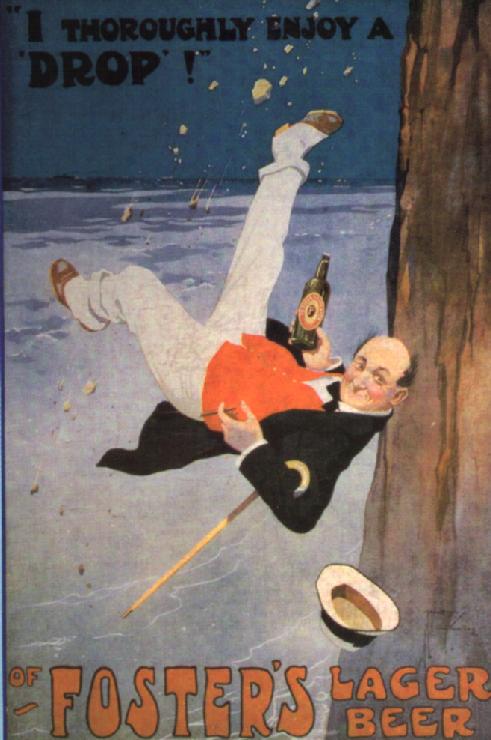 |
A Great Job that Pays Well MR R J Dooley has been appointed representative of the ballarat Brewing Co. in succession to the late Mr Harry Thompson whose dead body was found in the bay at Mordialloc. There were no fewer than 150 applicants for the position which carries a salary of 5 pound per week, all expenses paid and a free pass over the Victorian Railways. -Australian Brewers' Journal December 1907 |
| Strung Up AN extraordinary affair is reported from Woolgani (about 80 kms west of Coolgardie WA). A few weeks ago, a gang of men stationed there had a tarpaulin muster and 10 shillins was collected. The subscribers deputed one James Mead to proceed to Woolgangi and return with the value of the money in beer. In the course of time, the messenger came back but without the liquor. His mates there-upon held a court martial over the erring one and sentenced him to be hanged. Mead was immediately strung up and was left for some time suspended. When taken down, he was found to be in an insensible condition and almost dead. Considerable difficulty was experienced in taking the rope off the unfortunate man's neck and hours lapsed before he was brought around. -Australian Brewers' Journal May 1898 |
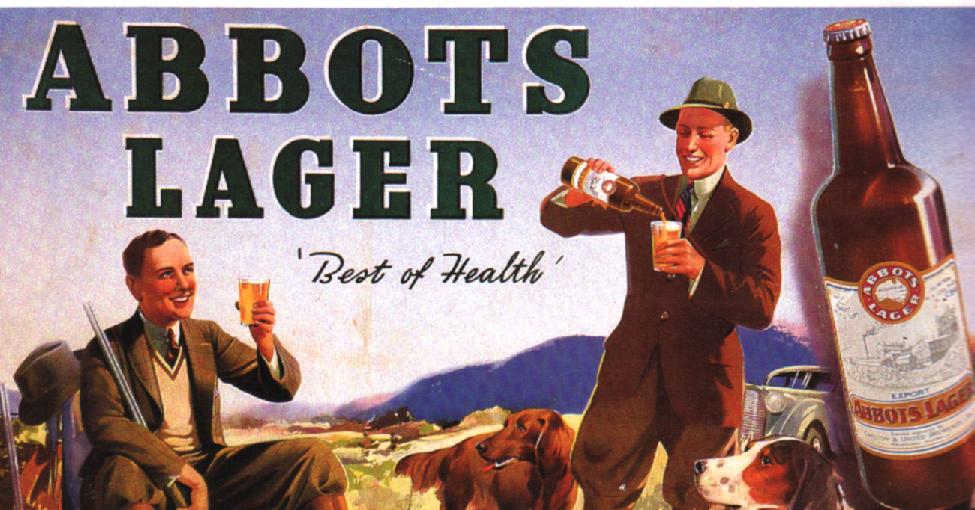 |
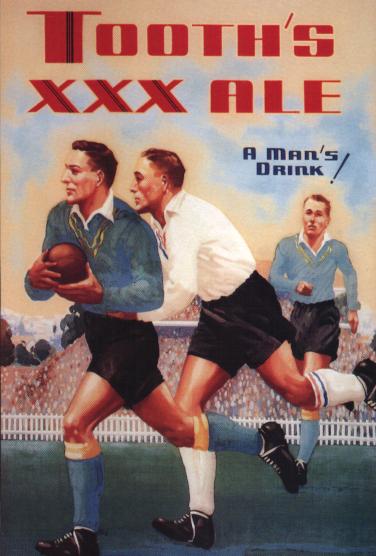 |
Christmas Lunacy THE brewers, as usual, gave Christmas beer to the gaols, lunatic asylums, and charitable instituations of Adelaide this year. This brought a protest, addressed to the Premier, from the Christian Endeavour Union, asking him to refuse the gift. I wonder if any other colony can beat this for narrow-minded Christianity? No public notice of the protest has been taken by anyone, much to the chargrin of the Endeavourers to provoke a discussion. -Australian Brewers Jounal, Jan 1898 |
HOPE FOR DUNKARDS - In our issue of Friday last we republished a paragraph professing to set forth a perfect cure for intemperance. We now quote another paragraph about the same matter, which should it possess all the virtue attributed to it, will be one of God's best gifts to man. The 'Pall Mall Gazette says: The physicians and temperance men of Chicago are very much excited over a new remedy discovered by a Dr D'Unger, which not only cures intemperance but leaves the drunkard with an unconquerable aversion to spirituous liquors. The medicine is called Peruvian bark (cinchonia rubra) called by druggists "quill bark," because it comes from twigs about the size of a quill. A pound of this bark is reduced to powder and soaked in a pint of diluted alcohol. It is then strained and evaporated down to half a pint. The drunken man is given a teaspoon of the medicine every three hours, and his tongue is occasionally moistened between the doses during the first and second days. The third day the dose is generally reduced to half-spoonful then to a quarter-spoonful, and gradually down to fifteen, ten, and five drops. The medicine is continued for a period of from five to fifteen days, and in extreme cases to thirty days; seven days is about the average. Dr D'Unger has cured 2,800 cases of the worst forms of intemperance by this treatment. He takes men "debauched by liquor for years - used up, demented, loathsome sots," and in ten days as a rule, makes sober respectable men of them, with a positive aversion to liquor in any form. -Illawarra Mercury Friday May 2 1879 |
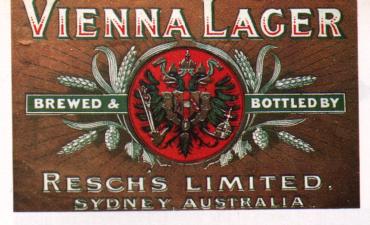 |